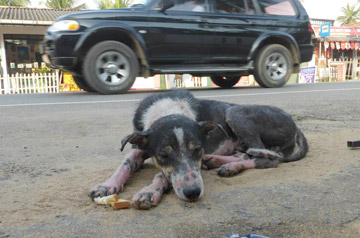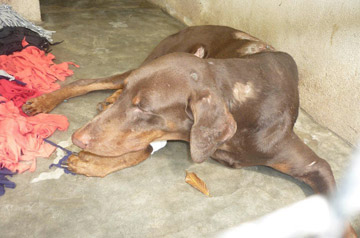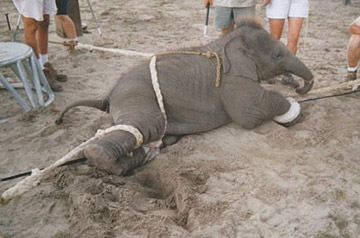|
Let's end the suffering of the voiceless:
A new Welfare Act will end animal cruelty
By Dhaneshi Yatawara
Mid last week, there was an outcry in social media requesting help to
get emergency treatment for a dog in Rajagiriya which was severely
wounded when acid was thrown at it. According to those who posted on
this Facebook page dedicated to street and vulnerable pooches, this dog
was the pet of a particular temple in Rajagiriya where over some issue,
this poor creature was attacked with burning acid.
 Luckily
some people were wise enough to inform the police and for the dog,
concerned, citizens informed the relevant social groups who work on such
cases. Further details are yet to be revealed as the Police
investigations roll on. Luckily
some people were wise enough to inform the police and for the dog,
concerned, citizens informed the relevant social groups who work on such
cases. Further details are yet to be revealed as the Police
investigations roll on.
Parallel to these events another social media outcry was spreading on
the torture of a female elephant in captivity in a leading temple in
Colombo. In fact a video taken by a frequent visitor to the temple on
how the animal was ill-treated by the mahout went viral on internet a
few weeks ago.
There was talk among the activists that the issue has been brought to
the notice of the monks at the temple and hopefully a solution will
come.
Torture
Every living being has the right to live without fear, without
torture. Yet in most cases humans have forgotten this rule of the Mother
Nature and majority of the humankind continue to abuse the other species
which they assume are inferior to them.
Humans have forgotten that all animals and plants are equal partners
of this eco system.
Hundreds of animals if not thousands face cruelty and torture at the
hands of 'inhumans' simply because they are born that way.
One could argue that when most of the members of the human species
cannot understand the agony or the pain of another human being, how
could we expect them to show empathy to an animal? Yet if our actions
are wrong they need to be corrected as much as possible to honour the
highly evolved brain and thinking ability the humans acquired through
natural evolution. To honour humanity above all. According to Sri Lankan
law, even dumping puppies and dogs is a punishable offence for two
reasons - as a cruelty to animals and risking public safety in health.
|

Jagath Gunawardena |
"Action can be taken against people who commit such cruelty under the
Cruelty to Animals Ordinance which was last amended in 1955.
Yet, timely changes were not made to the Ordinance for nearly 60
years," said Jagath Gunawardana, Attorney-at-law. Gunawardana has been
actively involved in wildlife protection and animal welfare for over two
decades and is the current Chairman of the Sri Lanka Environment Council
operated under the Central Environment Authority.Twelve years ago an
attempt was made to bring an Act for animal welfare, according to
Gunawardana.
Provisions
"The bill was drafted and published for public opinion nine years
ago, but nothing happened after that," he said. It was a still-birth.
"The attempt was to make a legal framework that looks in to animal
welfare going beyond animal cruelty aspect. Yet it was not implemented,"
he said.
But the existing law also has provisions to cater to any case of
animal cruelty. "Under section I and II of the Cruelty to Animal
Ordinance, action can be taken for the safety of the animals,"
Gunawardana said.
The Cruelty to Animal Ordinance protects animals in captivity,
domesticated or on any condition living under the custody of a human.
Even if a person captures a wild animal, tortures it and/or kills it,
that person can be prosecuted under this Ordinance.
"Even if it is a wild animal, if the person gets caught he comes
under the purview of this Ordinance," he said.
What sort of regulations does this Ordinance give - do and don'ts?
"The Ordinance does not mention any regulations as such or specify what
ought to be done. What it says is what ought not to be done.
 So
we have to deduce from these facts. For example if an animal is not kept
in an adequate space or in a cruel manner, this Ordinance gives
provisions to take action against the human. So, from this fact we can
deduce that animals need to be kept in spacious environments and when it
comes to cruelty even the fact that not giving water or food to the
animal is accounted for," he said. So
we have to deduce from these facts. For example if an animal is not kept
in an adequate space or in a cruel manner, this Ordinance gives
provisions to take action against the human. So, from this fact we can
deduce that animals need to be kept in spacious environments and when it
comes to cruelty even the fact that not giving water or food to the
animal is accounted for," he said.
Street pooch
Has this Ordinance being used effectively? "Yes very much in so many
instances by the Police," Gunawardana said.
For example, according to Gunawardana who went on to explain the list
of cases and two prominent ones had been in the past - in one case a
person has been prosecuted who had kept a dugong to be killed the next
day and another person who clubbed a Sambar captured from the wild. The
Police have the provisions to take action against such cruelty.
Do the street dogs and puppies and stray cats come under the purview
of the Cruelty to Animal Ordinance? "According to my opinion, yes, they
should be, but it can be argued otherwise too," he said.
Dumping
 Activists
against cruelty to animals raised their voice against authorities for
rounding up street dogs and puppies and dumping them in far-away places
when cleaning the city for CHOGM and recently for the Independence Day
celebrations. Activists
against cruelty to animals raised their voice against authorities for
rounding up street dogs and puppies and dumping them in far-away places
when cleaning the city for CHOGM and recently for the Independence Day
celebrations.
According to the law, rounding up street animals is not illegal, yet
one can argue on the methods used to do this.
According to the law, if the methods harm the animal, torturing it,
action can be taken even if it is done by a Government institute.
"There are two sides to this rounding up street animals - one is
definitely the harm to the animal, and on the other side state is
responsible for the healthy environment for its citizens.
But we also have to see whether such actions have really served the
purpose of creating a healthy environment by reducing the number of
street dogs and possibilities of spreading rabies.
Steps taken should give a sustainable solution," he said.
What are the weaknesses in this system? "Even if amendments are made
to this Ordinance, it may outweigh the present needs. So the best option
is to go for a new Act," he said.
As Gunawardana further stated there should be a uniform rule to cater
to this issue irrespective of personal opinions.
"To the later drafted bill there had been opinions opposing its
certain conditions by the Muslim Community.
What if the Buddhists want to totally ban any action on animal
cruelty according to their religion and Hindus come with their
perspectives? In my view, there should be a uniform rule to cater to
animal welfare irrespective of opinions of any ethnicity of religion,"
he said.
Law
"The new law has been drafted but the Ministry should bring it out
and in this case it is Ministry of Livestock Development. But it should
have ideally come from a law enforcement ministry such as a Ministry
under which the Department of Police operate because this is not only a
problem relating to livestock," he said. |

